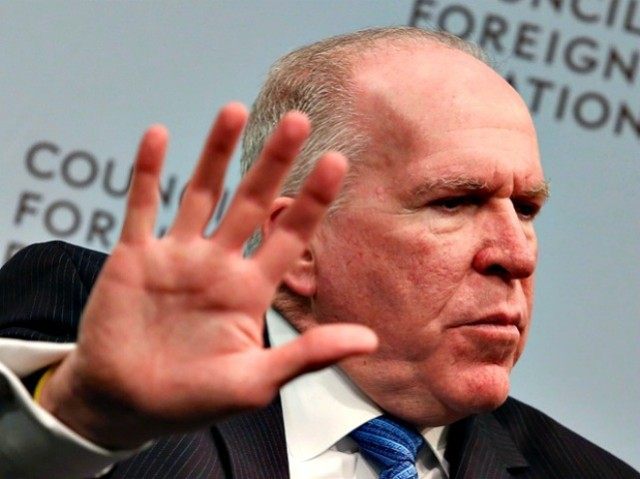—Wikileaks has begun posting the emails of CIA Director John Brennan, having presumably obtained them from the “stoned high-school student” who compromised his America Online account. Half a dozen of the documents that were attached to Brennan’s emails were posted on Wednesday, with Wikileaks promising that more would be forthcoming over the next few days.
The WikiLeaks mini-bio says of their subject:
Brennan went private in 2005-2008, founding an intelligence and analysis firm The Analysis Corp (TAC). In 2008 Brennan became a donor to Obama. The same year TAC, led by Brennan, became a security advisor to the Obama campaign and later that year to the Obama-Biden Transition Project. It is during this period many of the Obama administration’s key strategic policies to China, Iran and ‘Af-Pak’ were formulated. When Obama and Biden entered into power, Brennan was lifted up on high, resulting in his subsequent high-level national security appointments.
The first document posted was Brennan’s draft SF86 form, his “Electronic Questionnaire for Investigations Processing” or e-QIP. This is the 47-page form Brennan submitted to apply for his national security clearance. It contains a great deal of personal information about him—telephone numbers, his passport number, and his employment history, including previous stints at the CIA—which Wikileaks did not redact. His wife’s Social Security number also appears in the document. There are questions and answers about activities that were pertinent to Brennan’s new position as CIA director, including his contacts with foreign nationals.
A second document is a 2008 letter from the CIA’s legal counsel to the Government Accountability Office about a dispute between the CIA and one of its vendors, The Analysis Corporation (TAC). The CIA was “extremely concerned regarding the apparent disingenuousness” of statements made by TAC in this dispute, which arose after the Agency chose a different provider for a software project.
Brennan was the CEO of TAC – and also a consultant to the 2008 Obama campaign – when one of its contract employees was accused of improperly accessing the passport files of Obama, Hillary Clinton, and Senator John McCain, prompting an investigation by the State Department.
Another document is a strategy memo, generically addressed to whoever would become President in 2009, on the “Conundrum of Iran,” which asserts “the United States has no choice but to find a way to coexist – and to come to terms – with whatever government holds power in Tehran.”
The memo is unfinished, with many of its lines merely placeholders for paragraphs yet to be written. One passage faults President Bush for his “gratuitious labeling” of Iran as “part of a worldwide Axis of Evil,” and faults the Bush Administration for not properly recognizing Iran’s “positive engagement in helping repair the post-Taliban political environment in Afghanistan.”
The final two documents concern enhanced interrogation methods, which Wikileaks blithely labels “torture,” although the purpose of the memos was to pin down which techniques would be permissible for interrogating terrorist suspects.
One document is a May 2008 letter to the Senate Intelligence Committee from its then-Vice Chairman, Senator Christopher “Kit” Bond of Missouri, suggesting that following the Army Field Manual for such interrogations would not “exhaust the universe of techniques that could be authorized consistent with the Geneva Conventions.” Bond suggested instead developing legislation that would prohibit techniques prohibited by the AFM, rather than using only the nineteen techniques it explicitly permitted.
This letter is accompanied by what looks like a draft version of the legislation Bond had in mind, listing the expressly forbidden interrogation techniques.
The Verge writes about the Wikileaks publication:
Finding a host for much of the email data has proved more difficult than usual. The web figure ChthuluSec, who has hosted leak archives in the past, announced he had received the archive earlier this week, but held off publishing the archive over concerns he might be extradited to face trial in the US. The CIA announced it had referred the breach to US law enforcement, although it’s unclear what legal recourse the agency might take.
None of these initial documents seems like a devastating revelation, but it is profoundly embarrassing for the CIA Director to have his personal email raided and exposed this way, and the Obama Administration has absolutely no leeway for any more cyber-security scandals. Also, the exposure of personal information from Brennan’s SF86 form could prove troublesome for the Director and his associates, if the data it reveals is current and accurate.

COMMENTS
Please let us know if you're having issues with commenting.